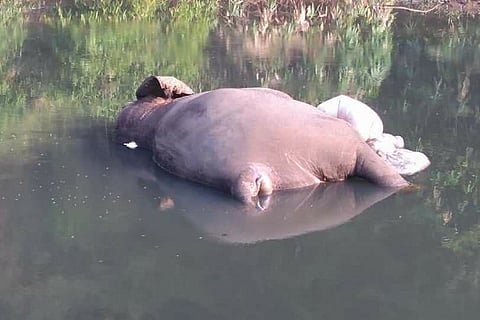

The death of an elephant from consuming plastic near Sabarimala in January highlights the risk that indiscriminate dumping of plastic waste in forests poses to the lives of wild animals.
Every year, thousands of pilgrims trek through dense forested hills in the Pamba River basin to the abode of Lord Ayyappa during the annual pilgrimage. Sabarimala is part of the Periyar Tiger Reserve, a rich biodiversity home to several species of wild animals and plants.
However, pollution caused by pilgrims, especially dumping of plastic waste, has emerged as a threat to the ecosystem in and around the famous temple.
When a group of wildlife and environment volunteers from the state visited the path leading to Sabarimala a few days ago, they found huge amount of plastic waste in the forest, including wrappers, bottles, carry bags, etc. They allege that the cleaning staff responsible for clearing garbage from the pathways usually dump it in the forests after collection.
"On February 10 and 11, we went to Appachimedu, which is 1.5 km below Sabarimala Sannidhanam. We saw lots of plastic waste dumped in plastic bags. For sure, that was not dumped by the pilgrims but by the cleaning staff and temporary hotel staff. It may take one month to remove that waste from the area," Praphul S Nair, a volunteer said.
On a prior visit to Valiyanavattam - the same day the elephant was found dead - the group found plastic wrappers and even cloth present in elephant dung in the forest.
"This is not a stray incident. Earlier, bodies of pigs, who play a major role in cleaning the garbage, were also found. Though the cause of their death is unknown," he said.
P Johnson, beat forest officer, Sannidhanam forest station blames the collective inefficiency of several departments that are responsible for treating waste generated during the pilgrim season.
He said that prior to the death of the elephant on January 27, a barking deer had died after consuming plastic last year.
"The sewage plant set up by the Devaswom Board at Pamba functions only during the pilgrim season. Once the pilgrimage ends, we have no option to treat the waste. After taking up the issue with the Devaswom Board, the sewage plant was opened for three days. But that won't address the problem. It is only after the pilgrim season is over that most of the plastic or other waste can be collected from inside the forest and it is at that time the plant should be kept open," he observed.
Johnson added, "The Punaym Punakvanam project, a joint attempt by several departments, does only a part of the work. They collect waste from Triveni to Nunungar, one of the paths used by pilgrims. But no clean-up is done on the other stretches or inside the forest. There is another cleaning team called the Sabarimala Sanitation Society which comes under the Revenue Department. This team also stops work on the day the season is over. Neither do these cleaning projects address the real issue nor do they remove plastic or other waste completely."
Though the Kerala High Court banned the use of plastic in Sabarimala in 2015, the order is not being implemented properly. Another issue, Johnson pointed out, was that since the sewage plant is situated on an acre of open land, this often attracts wild animals which end up eating from garbage.
The volunteer group that Praphul belongs to has now started a campaign called the "Poonkavanam Mission Green".
"The main problem that the forest department is facing is that there is no sustainable and sufficient mechanism for recycling plastic waste," he said.
Meanwhile a blame game has begun between the Travancore Devaswom Board and the forest department with the former accusing the latter for the animal's death.
Stating that area where the pachyderm was found dead comes under the jurisdiction of the forest department, TDB president A Padmakumar told Deccan Chronicle, "The places where there is major presence of the plastic materials come under the forest department and the TDB cannot do anything to remove them. We have sanitised the places coming under us."